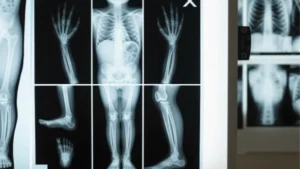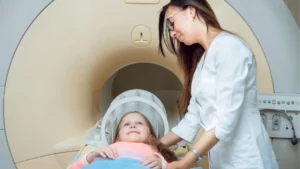Mothers prioritize their child’s health above anything else when they are pregnant. A healthy mother is essential to a good pregnancy.
Mothers prioritize their child’s health above anything else when they are pregnant. A healthy mother is essential to a good pregnancy.
If you have concerns about your health or your unborn child, radiological tests may be required to aid in management and therapy.
X-ray technologies are often used in radiological scanning treatments. While these procedures are generally regarded safe, they carry a slight risk of radiation exposure.
If you’re expecting a child, you should steer clear of any scans that include the use of radiation. In the case of pregnant women, x-rays and CT scans are not recommended.
However, what if scans are necessary? This article will answer your concerns about MRI scans during pregnancy.
Can You Get An MRI While Pregnant?

Today, a diagnostic imaging technique known as magnetic resonance imaging (MRI) is widely employed in the medical community.
This exam doesn’t require radiation since it generates pictures with the help of a magnetic field and radio waves.
They help see what’s going on within the body and determine whether anything is wrong. In a nutshell, the answer to the question above is yes.
The safety of your unborn child is not at risk by having an MRI done during your second and third trimester of pregnancy. In fact, it can help avoid neonatal death.
Currently, there are no recognized dangers to pregnant women who get an MRI scan. Many pregnant patients have undergone MRI tests in the last few years.
A baby’s development appears to be unaffected by exposure to the radiation they emit.
If the thought of having an MRI while expecting makes you uneasy, there are other imaging examinations you may choose for, such as an ultrasound.
An MRI scan may be recommended if ultrasound is not enough in some cases.
It is in your best interest and that of your developing baby to agree with any doctor’s recommendation for an MRI scan — mainly if it is because of an urgent or serious sickness.
You may feel scared. Maintaining your health as a mother, after all, is paramount to giving birth to a healthy child.
An MRI scan is a medical procedure in which both you and your developing fetus participate.
Why Would You Need An MRI During Pregnancy?

MRIs can be ordered for a variety of reasons. In general, an MRI can assist your doctor in properly diagnosing you and prescribing a course of therapy by identifying the underlying cause of your health condition.
An MRI scans a specific area of your body based on your symptoms:
- Bone problems and illnesses
- Problems with the digestive system
- Pelvic issues
- Dementia and abnormalities in the brain, such as tumors
- Your veins or arteries may be malfunctioning.
- There might be issues with your spine, such as disc disorders or spinal malignancies
- Lung damage
- Heart problems
- Sports injuries
- There are issues with your vision or hearing.
Alternatives To MRI
An MRI scanner is a sophisticated piece of medical technology that can only be found in specialized facilities and costs a lot of money to operate.
MRI alternatives may include, but are not limited to, the following:
- Biopsy
- A blood test
- Ultrasound
- X-ray scan known as a computed tomography
- X-ray Examination
Pregnant Women And MRI Risks
You may be wondering what happens if you have an MRI while pregnant? For pregnant women and their unborn babies, MRI scans pose no known dangers.
More than a quarter of a million pregnant women have undergone MRI examinations over the past 30 years, and no known adverse effects have been discovered.
Having a healthy mother is the most crucial component in having a healthy kid. The mother’s health and the health of the unborn child are intertwined.
MRI During Pregnancy

MRIs typically take between 15 to 90 minutes to complete. If your fetus is really active during the scan, expect the test to go a bit longer.
In the MRI machine, you will be asked to lie on your back or your left side for the duration of the examination.
MRI machines must be designed in this manner to provide your MRI techs with the best pictures possible, even if the aperture you lay inside isn’t very broad.
Neither the magnet nor the opening can contract. The table you lay on slides you into and out of the machine; there are no other moving parts.
The MRI technologist will place Pillows and noise-canceling headphones on your head to ensure that you are as comfortable as possible during the procedure.
You’ll be able to pick and choose which Internet radio station you want to listen to. The technician can also shield your eyes from the MRI machine by placing a towel over your eyes. Women can get fetal MRIs every day.
During the procedure, a chemical substance known as gadolinium contrast media or contrast agent is injected into your body to improve the quality of the MRI images.
Is An MRI Available To Any Radiologist?
Not all radiologists are qualified to read a fetal MRI, especially if the patient is expecting a child. The majority of medical establishments don’t provide it.
Every week, One Step Diagnostic does about ten prenatal MRIs, allowing us to stay abreast of new research in the field of prenatal imaging.
Most parents want to know if there is a possible concern. You want to make sure that the individual doing your scan has a thorough understanding of the results and can explain them to you. An expert in MRI scans, like One Step Diagnostic, can accurately read the scan results.
Contact us now if you want to know more about this procedure and other services we offer. We are accredited by the American College of Radiology.




